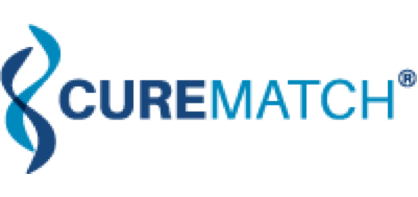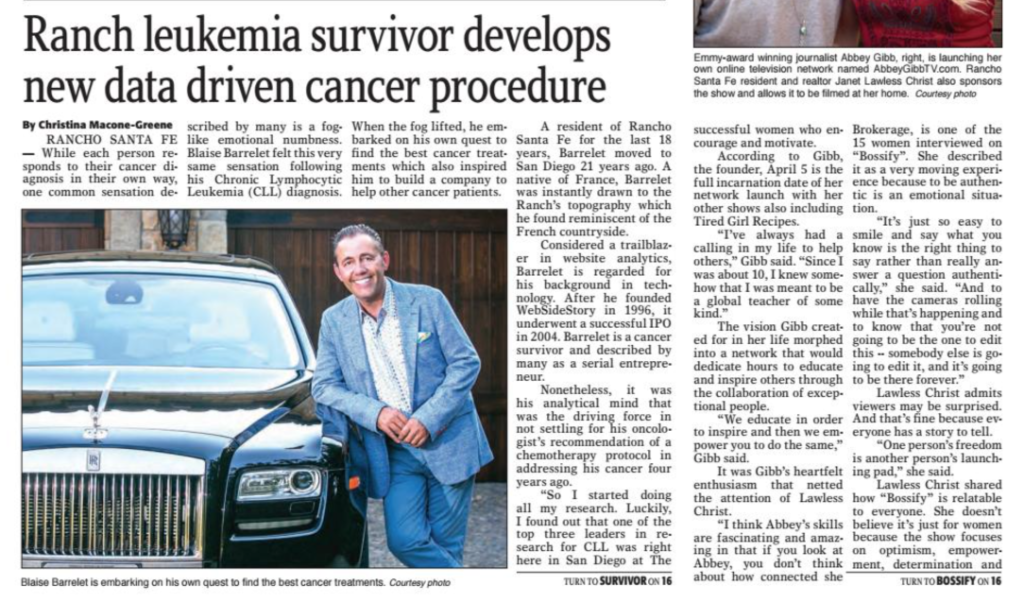The CureMatch Story
The Rancho Santa Fe News interviews CureMatch CEO Blaise Barrelet to discuss his personal battle with Leukemia and the motivation behind the founding of CureMatch.
Rancho Santa Fe Resident Launches Company to Provide Personalized Cancer Care
CureMatch is a decision support platform designed to offer personalized medicine in cancer care. Operating on the belief that cancer is a personal disease that shouldn’t be treated with a one-size fits all treatments and procedures, the software technology enables matched combination therapies that are unique for individual patients based on the molecular profile of the patient’s tumor.
“Matched combination has been shown to have higher response and survival rates than traditional chemotherapy or targeted mono-therapies,” Barrelet said.
Barrelet, a native of France, has lived in Rancho Santa Fe for 18 years. A self-described “tech guy” and “serial entrepreneur,” he has started several successful businesses, including WebSide Story in 1996, one of the first internet businesses in San Diego. The company was also one of the first to provide web analytics for websites and he ended up selling it to Adobe Software in 2004 in a billion-dollar deal.
Barrelet then retired a “little bit” but didn’t really like being sidelined so decided to get back in the game helping other start-up businesses. He founded Analytics Ventures about five years ago, a venture-formation fund that works with scientists to create new data-enabled technology and software businesses.
Barrelet’s latest venture, driven by a desire to help cancer patients, was a result of his own experience. Four years ago, while his wife was pregnant with their fourth child, he received the shocking diagnosis of Chronic Lymphocytic Leukemia (CLL).
“The doctor told me ‘There’s good news and bad news. The good news is: it takes time to kill you. The bad news is: there is no cure,’” Barrelet said. “At first I felt really numb, I didn’t understand, I had it all, I had fun building companies and I had made lots of money. My next reaction to cancer was anger: ‘Why me?’ The third reaction was: ‘I’m going to beat this.’”
He was fortunate to be living in San Diego, where the top CLL specialists in the world work at UC San Diego Moores Cancer Center. Barrelet wasn’t sure that chemo was the best course of action for him so he started the process of learning all he could about targeted-therapy drugs, drug combination therapy and the use of DNA sequencing.
The more he learned about the “amazing” and “phenomenal” developments in the cancer treatment field, and the more his health benefited from the alternative to chemotherapy, the more he was determined to start a company that would help others.
CureMatch uses technology originally created and licensed by a multi-disciplinary team at Moores Cancer Center and the San Diego Supercomputer Center.
Using the latest molecular profiling tools, such as next-generation sequencing, CureMatch identifies the unique nature of the patients’ tumor and helps personalize the most advanced treatment options, including targeted therapy and immunotherapy.
With combination therapy, it’s possible to use combinations of drugs to target multiple cancer mutations at the same time.
Barrelet said CureMatch is the result of his two incredibly smart co-founders: Igor Tsigelny and Razelle Kurzrock. Tsigelny, a research professor at San Diego SuperComputer Center and Moores Cancer Center, is world-renowned expert in structural biology, molecular modeling, bioinformatics and structure-based drug design. Kurzrock is a pioneer in pathology and combination therapy who serves as the director of the Center for Personalized Cancer Therapy and Clinical Trials Office and is senior deputy director for clinical science at Moores Cancer Center.
The way a non-medical person like Barrelet likes to explain what they do is by using the analogy of boats floating on water — cancer is the water that comes and punches holes in the boat. Every hole is a genetic aberration.
Barrelet compares chemo to using a bucket to bail water out of the boat as it is sinking and mono-target therapy can plug the biggest hole in the boat but water can still find a way in. Cancer treatment has changed and there are now 300 FDA-approved cancer drugs designed to go after the variety of different holes in a boat.
“What we’re doing at CureMatch with matched combination therapy is quite complex —effectively plugging every hole in the boat. Of the 300 cancer drugs there are 4.5 million possibilities to combine drugs. It’s so complex because there’s so much data,” Barrelet said. “We take the data and make insight out of it and figure out the best drugs for each patient.”
CureMatch produces the top 3 to 4 combinations for each patient and scores them with a unique scoring system to rank treatment options to optimize patient care. The patient then goes to their oncologist with actionable knowledge — it is not a substitute for the physician’s decision, but provides the physician with a score for any options they have in mind and provides new combinations of drugs.
With cancer care, Barrelet said he hopes to see something similar to what happened with HIV, which is now primarily treated by combination therapy due to patient advocacy.
“Cancer patients are the best ambassadors. When you know you’re going to die, you’re willing to do anything. That’s the best way to change things,” Barrelet said. “To me, it’s so enjoyable to do something using my skills, net worth and knowledge that is about more than just making money. This is about saving other people, empowering patients and making a difference.”

